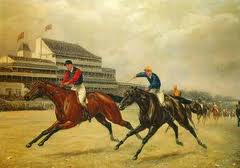
A suit before the Vice Chancellor's Court gives the curious public a closer look at the Rev. Henry Prince, founder of Agapemone, a mysterious religious commune in Somerset.
Prince, a defrocked C-of-E curate, styled himself "the Beloved," claiming to be, variably, John the Baptist or the prophet Elijah. He fully believed in his own immortality and that of his faithful. At its peak, his 200-acre "Abode of Love" near Spaxton had hundreds of followers living behind locked gates. Polygamy was suspected but even worse, Rev. Prince reputedly made love with favored disciples in front of the congregation! One snoop, who braved the hungry hounds roaming the estate, reported seeing nothing more sinister however, than men and woman playing a "joyous" game of field hockey.
The suit in question involves the peculiar Nottidge sisters of Stowmarket. Three of them had married "Brothers" of Rev. Prince. The fourth and eldest, Louisa, a simple-minded woman, had joined up first but, in late 1846, she had to be committed to an asylum for almost two years. On the very day of her release, Prince's minions escorted the hapless woman to her stockbrokers where she signed over to "the Beloved" some £5700 in 3% annuities. When Louisa died in 1859, her brother Ralph - who had failed to show the devotion of his sisters - filed suit alleging "misrepresentation, deception and undue influence due to Louisa's religious delusions." Rev. Prince, claiming piously to be more interested in truth than money, accuses the family of hypocrisy. They too, he insists, are only after her money. After four days of testimony and a month of deliberation, the court rules for Ralph Nottidge, finding it shocking that Louisa or any human being could be found "with an understanding so weak and degraded." As for Rev. Prince, the Vice-Chancellor thought him guilty of a gross imposture, mitigated only by the fact that he is '"under the influence of a disordered imagination."
The Times hailed the decision but feared that religious credulity would seem to be "an ineradicable weakness of the human intellect." Although the unfavorable publicity sent Agapemone into decline, "the Beloved," while not immortal, lived on with his followers to the age of 88. He was succeeded in 1899 by the Reverend John Smyth-Piggot, who still wore the vestments of the Church of England. Smyth-Piggot continued the tradition of selecting his "spiritual wives" from the congregation until he was at last dismissed by his Bishop for "wickedness of life."
A sketch of "The Abode of Love" from the Illustrated London News.


